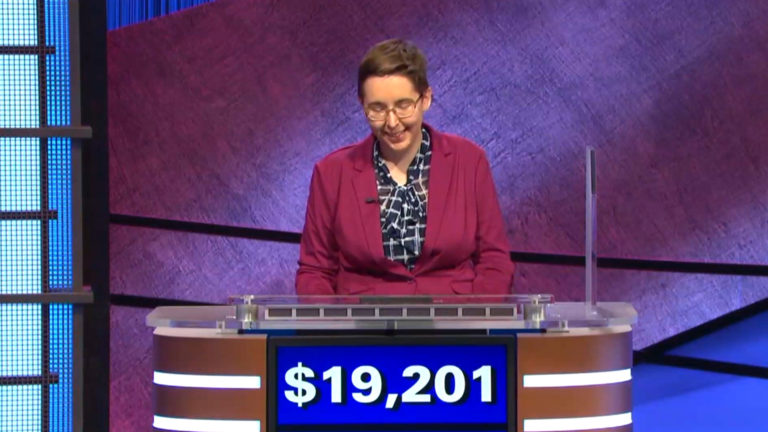Magical Realist
Valued Senior Member
"Guessing a correct answer to a question on Jeopardy! is one thing, but accurately predicting your winning total? That must take some kind of magic power. Yet, that is precisely what contestant Katie Sekelsky did when she secured her third win in a row this week.
Sekelsky, a graphic designer from Kent, Ohio, won the Tuesday, June 15 episode with a winning total of $19,201, a number she had prophesied just days earlier:
“The night before my first @Jeopardy taping, I was alone in the hotel, trying to calm down and “visualizing” a win,” she tweeted on Wednesday. “I sketched myself at a podium, with a winning-type dollar amount. And that winning-type dollar amount was $19,201. This is real.”
For any potential doubters, Sekelsky attached a photo of the sketch and confirmed that she had sent the drawing to several people before taping the episode in question. “THERE ARE RECEIPTS,” she stated emphatically. She also explained that the drawing didn’t influence her wagering on the show and that she was just betting what she needed to to win."
https://www.tvinsider.com/1002660/j...k4hPpMzWT0_Kc9pHGGRjeW3iId6nkmJY_o7pglT4JA3OM

[Image: E4Av-mEVkAYXmdY?format=jpg&name=small]

I can't decide if this is evidence of precognition or of synchronicity. The fact that it surprised even her suggests the latter. Synchronicity happens when you aren't looking for it. Surprise and wonderment seem to be crucial elements in its happening.
Sekelsky, a graphic designer from Kent, Ohio, won the Tuesday, June 15 episode with a winning total of $19,201, a number she had prophesied just days earlier:
“The night before my first @Jeopardy taping, I was alone in the hotel, trying to calm down and “visualizing” a win,” she tweeted on Wednesday. “I sketched myself at a podium, with a winning-type dollar amount. And that winning-type dollar amount was $19,201. This is real.”
For any potential doubters, Sekelsky attached a photo of the sketch and confirmed that she had sent the drawing to several people before taping the episode in question. “THERE ARE RECEIPTS,” she stated emphatically. She also explained that the drawing didn’t influence her wagering on the show and that she was just betting what she needed to to win."
https://www.tvinsider.com/1002660/j...k4hPpMzWT0_Kc9pHGGRjeW3iId6nkmJY_o7pglT4JA3OM

[Image: E4Av-mEVkAYXmdY?format=jpg&name=small]

I can't decide if this is evidence of precognition or of synchronicity. The fact that it surprised even her suggests the latter. Synchronicity happens when you aren't looking for it. Surprise and wonderment seem to be crucial elements in its happening.
Last edited:
